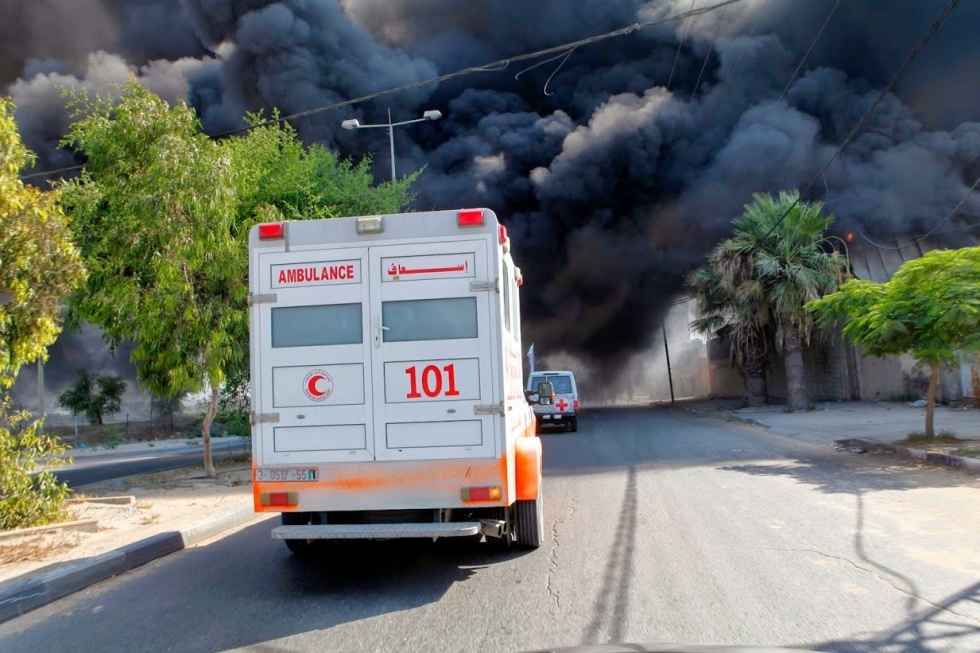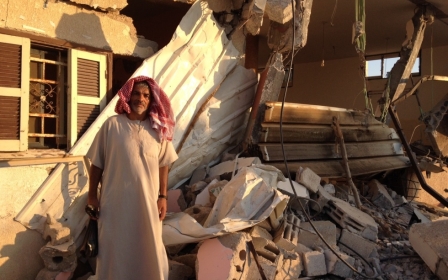'401 is not a number'

GAZA CITY - Fouad Jaber, the first ambulance crew member killed in Israeli's assault on Gaza more than a month ago, is only now being remembered amid a semblance of peace. The five-day ceasefire since 14 August has given his family moments to reflect on the life Fouad, who left behind a two-year-old daughter, Hala, his young wife and parents, and a deep sense of loss.
His family recounted his story to MEE, which has not been noticed by local or international media.
The 24-hour shift for the 28-year-old Fouad Jaber was over. Umm Hala, his wife, would usually hear from him if he was staying late. But this day there was no call.
A ground attack had taken place on the eastern Gaza City neighbourhood of Shuja'iyeh, and Fouad's phone seemed to be turned off. His father tried to locate Fouad by calling some ambulance-crew colleagues. They said he was working on the front lines, evacuating the injured and dead from buildings wrecked by Israeli tank shells.
"I had an unusual feeling, something deep in my heart," said Fouad's father.
Fouad's mother urged her husband to call his son's number again, but he replied that Fouad was likely busy rescuing desperate people and that they shouldn't bother him.
After some time, with shaking hands he picked up the phone anyway and dialed the number of Fouad's boss at Medical Services, who told him: "You are a strong man, and I must tell you that your son has been killed."
Fouad's father was stunned, and he then had to tell his wife and mother.
His mother, Umm Fouad, had heard on the TV that an ambulance driver and journalist had been killed together and also felt a deep sense of dread. The journalist was identified as 24-year-old Khaled Hamad, who was working for a local media company.
Fouad's ambulance had been the first to get through to evacuate the injured and dead in Shuja'iyeh. He managed to rescue many people. At some point his ambulance sustained damage from an Israeli tank shell, but he still managed to continue.
He got inside one of the homes where women and children were appealing for help before he, himself, was fatally hit by an Israeli mortar shell.
Israeli troops allowed ambulances through only after a few hours of humanitarian ceasefire was allowed. When another ambulance crew managed to get inside the house and dig people out of the rubble, they saw an orange ambulance vest and realised the body was that of their colleague and good friend, Fouad.
"Oh my God, Fouad, Fouad!" a fellow ambulance driver had cried, trying to wake him. But Fouad had died before they found him.
Abu Fouad says he always wanted to support his son in being a nurse, and was proud when he received his nursing qualification. But his son then decided to use it to become an ambulance driver and help people who were in emergency distress.
"I will always be proud of him and the work he dedicated himself to," he told Middle East Eye.
Responding to the desperate calls and pleas of victims and their families kept Fouad on the run; there was never a call for help that he didn't respond to. At the time of his death, he had not been home for two days; usually, Fouad would drop by to quickly pick up some food and coffee for his colleagues. His dedication to his work earned him a strong reputation among his fellow rescue-team workers.
"I won't get home until the war is over," Fouad had told one of his colleagues.
His father, tears running from his eyes, told MEE: "When Fouad was killed, I felt the pain of all the families who have lost loved ones, I felt the agony of separation. I felt how parents feel when they bury their children and return home with an empty heart and empty handed."
He continues: "Never think that [Israeli Prime Minister Benjamin] Netanyahu is killing without precision. No, he knows he is killing innocents, including children.
"It's not about an apartment being bombed, or a house being razed to the ground. It's the loss of a dear beloved son that matters to the heart." Israel did not kill just an ambulance driver it killed a good man, and a kind heart.
Fouad's father, who himself still has shrapnel in his head and leg from injuries in the first Intifada, the Palestinian uprising in the late 1980s and early 1990s, takes comfort from the fact that his son was doing an honorable job. Still weeping, he says: "Even if they kill us one by one, Palestine, Al Quds [Jerusalem], Barbara [a village cleared of Palestinians in 1948] and Haifa will never die in our hearts."
Last contact
One cheerful memory he holds dear is when he said to his son: "Fouad, you have your education, and we gave you the best wedding ever. But when I die, who will pay the debt? And Fouad replied, 'Daddy, I will do that'."
But now his father must take of everything, including the debts his son was happy to shoulder. He must also take care of Fouad's wife and child.
Already, Abu Fouad has taken the first painful steps to take over his son's burdens. He has been to the pharmacy where his son had worked and gathered medicine for patients in need. He told them that if Fouad owed any money he, Abu Fouad, would pay it back.
And yet, "all people told me they owed him money. Fouad was getting medicine for those who couldn't afford it."
One of Fouad's colleagues had asked him what number victim he would be if he was killed by Israeli tank shells. Fouad had replied, "Oh, any number after 400."
In the event, Fouad was victim 401 in Gaza, as confirmed by Shifa hospital logs.
Earlier, as phone calls constantly came in to the emergency dispatch center from people needing help and rescue, Fouad had asked his boss that, if anything happened to him, not to put his body in the morgue.
That was his wish before he died. After five hours, his body was returned to his family; his forehead cold, his face clear, and his still lips saying so much to his family, says his mother.
His wife, Umm Hala, says Fouad was committed to his job, and always wanted to keep it.
The night before he was killed, he called his wife and told her: "Say some prayers for me and take care of Hala."
Saying this, she bursts into tears, her sobs filling the silence of a ceasefire that came too late to save her husband and others he had devoted his young life to.
Stay informed with MEE's newsletters
Sign up to get the latest alerts, insights and analysis, starting with Turkey Unpacked
Middle East Eye delivers independent and unrivalled coverage and analysis of the Middle East, North Africa and beyond. To learn more about republishing this content and the associated fees, please fill out this form. More about MEE can be found here.




